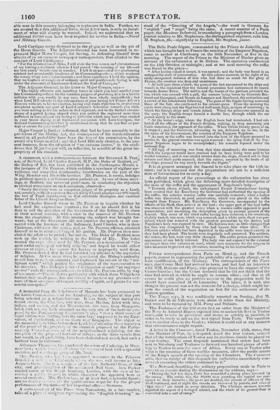A statement, with a correspondence between the Reverend R. Pear d -
son, of Bedford, Lord Charles Russell, M.P., the Duke of Bedford, an the Bishop of Ely, has been published in the Northampton Herald, a the instance of Mr. Pearson, which exhibits a specimen of vigilant sur- veillance and somewhat domineering interference on the part of the Whig Member and his noble brother. Mr. Pearson, it seems, indulges in political speeches at Conservative gatherings. At one of these meet- ings, at Bedford, the reverend gentleman, in combating the objection to clerical attendance on such occasions, observed- " Surely the clergy were as competent judges of its propriety as a Lamb, not, certainly, without a spot—a Russell, fed by Church plunder—an O'Connell, the tool of Papal tyranny—or as that admirable theologian and excellent father of the Church Josepltus Hume."
Lord Charles Russell wrote to Mr. Pearson to inquire whether he had used the expressions reported ; for if so, he should feel it his duty to call the attention of the Covernors of the Infirmary to them at their annual meeting, with a view to the removal of Mr. Pearson from the chaplaincy. At this meeting the subject was brought for- ward ; but as the. Governors did not consider the speech at all con- nected with the interests of the Infirmary, Lord Charles, who is their Chairman, withdrew the nethet, and, as Mr. Pearson affirms, admitted himself to be in error eed 1 ,e;ned his pardon. Mr. Pearson then con- cluded the affair to be ended ; but not so. The Duke of Bedford next took up the matter, by writing to the Bishop of Ely. The latter treated the caps ,sions used by Mr. Pearson as a desecration of " the most awful mystery of cur holy religion," and hoped lie would either disavow or expo, s his sorrow for having so improperly used them. Mr. Pearson denied that he had lute:tad any allusion to the mysteries of' religion. At the same time, he qeestioned the Bishop's authority to call him to set.:h an account ; and expressed his sort ow at the "ma- lignant spirit" which guided the originators of the representation to his diocesan. 1 lie Bishop's letter of indignation at such "an improper answer ends the correspondeeee ; to winch Mr. Pearson adds, by way of comment—'- The vie lietive pertitmcity with which these Whigs have hunted their small game, has not served to increese my previous esti- mate of their sweetness of temper, nel,ility if spirit, and genius nr suc- cessful enterprise."


























 Previous page
Previous page